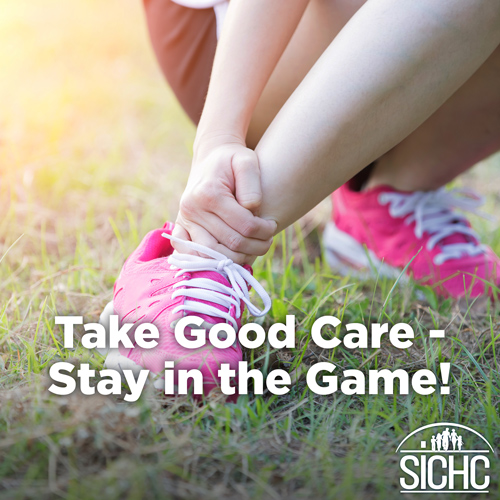Take Good Care – Stay in the Game!

By Shannon Dooley, MSN, FNP
Whether you’re playing a pickup game in basketball, heading back on the field in high school sports, enjoying an occasional hike or bike ride, or just enjoy being active, following certain principles can enhance your sports experience and reduce the chances of being injured.
Staying active with moderate and regular exercise is good medicine for most people. All kinds of good health outcomes generally come with regular exercise and sound eating habits. These include increased energy, reduced rates of common disease conditions, improved mental alertness and performance, high sense of well-being and more.
But if we’re not prepared or aware, any attempt to engage in exercise can result in discomfort or worse, injury. Here are a few suggestions that can help you enjoy exercise and stay in the game.
Set some goals for fitness. Some people want to improve their fitness to help lose weight. Some may want to increase energy. Some may want to run in a marathon. Whatever your goal(s) it is generally helpful to write them down to improve focus.
Translate your goals into a daily routine. Many physicians and nurse practitioners recommend getting two and half hours (150 minutes) of moderate aerobic or physical activity a week. If you can squeeze more activity time in and occasionally bring in some more vigorous activity, you’re likely to get even better health benefits. Remember that even small periods of activity are more helpful and beneficial than no activity, especially in our sedentary society where many people work at a desk or sit for long periods of time.
When starting out, pace yourself. If you’re planning on a run, getting on the court for a brisk game of one-on-one, or picking up some weights in strength conditioning, warm up first. Do some gentle stretching and body movements to help saturate your arms and legs with good blood flow and loosen up a bit. Don’t try to do too much too soon.
Discomfort or pain generally means something is not right. Mild physical discomfort or stiffness can simply mean that you’re exercising some muscle groups that aren’t used to being exercised. That means your level of exercise is probably at a good level. As you increase frequency or exercise or workouts, those areas of discomfort will likely go away as you become more fit.
Chronic, uncomfortable pain is a different story. An ankle sprain, pulled or strained muscle, or dislocated joint all are areas that produce moderate to sharp pain and may require professional medicine treatment. Listen to your body.
Activity balance is important. If you’re planning on working out to build strength or endurance, make sure that you engage different parts of your body to uniformly build fitness. Exercising different parts of your body on different days can help build optimum fitness. For example, giving your biceps a rest on one day while focusing on abdominal muscles can help provide a good balanced approach to improving fitness. Progress slowly and don’t overdo it.
Be flexible. If you’re a little too sore, or don’t feel good, give yourself a day off. Don’t try to grind through pain.
Get professional medical advice. When we’re active, the odds are eventually we’ll get some kind of injury. Preventative work – warming up, eating a sound diet, getting adequate sleep, having good shoes, progressing at a reasonable pace and the like – can help us avoid injury. But we can accidentally come down hard after a rebound or step into an unseen pothole on a run and suffer a moderate or severe ankle sprain. If you suffer a painful injury, don’t try to tough it out – get professional medical attention. You likely will recover faster and suffer less pain, both in the short- and long-term.
Plus, if you’re injured and not able to play in an important game, or on the couch and can’t move, perhaps missing your friends and social outlet, (or feeling depressed due to change in routine), consider getting a different kind of coaching – seek professional mental health care through your provider.
And by the way, if you’re planning on starting up a fitness program – particularly if you’re 40 or above, haven’t exercised for a while, or have a condition like diabetes – it’s always good to check with your physician or medical professional before you begin. Your provider can give you helpful tips to maximize your fitness program and also check for any possible problems that may complicate your plans.
Using good sense and embracing a regular plan of moderate exercise will provide many benefits. Take good care – and stay in the game!
A Family Nurse Practitioner (FNP) with Southern Indiana Community Health Care (SICHC), Shannon Dooley also holds a Master’s Degree in Nursing and has been certified by the American Academy of Nurse Practitioners since 2003. She and her husband enjoy camping, traveling and family life with their son.
